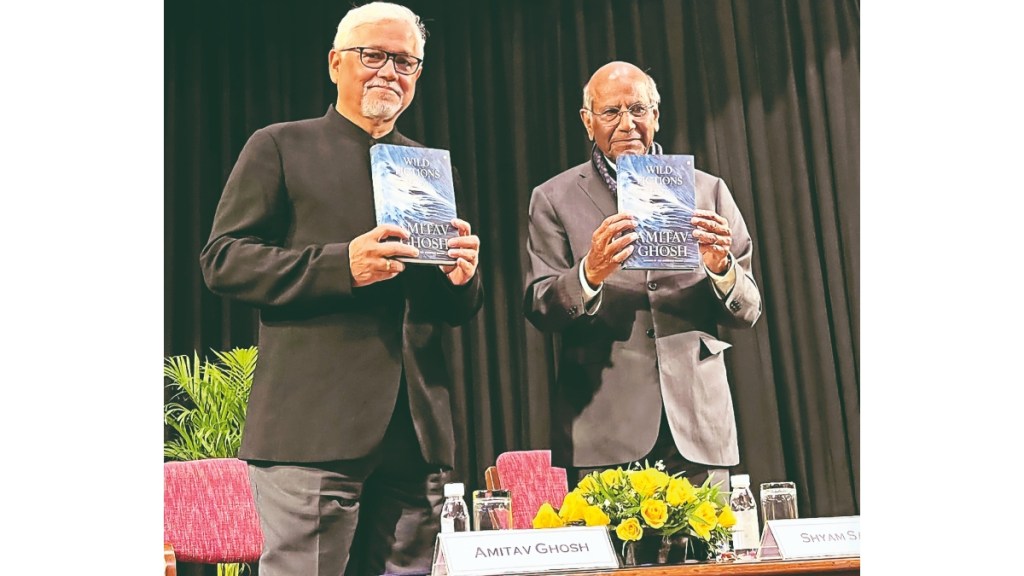Author Amitav Ghosh talks about his latest book, Wild Fictions, the need for urgent action on climate, and collective agency at the grassroots.
Wild fictions that are not really wild. Is it unfortunate that it is easy to be prescient on climate in present times, as you have been on more than one occasion?
It is, indeed, a bitter irony that it has become so easy to be ‘prescient’ on climate change. The warnings, the predictions, they have been there for decades, even centuries, if one knows where to look. But the inertia of systems, the stranglehold of vested interests, the seductive allure of short-term gains— these have proven far more powerful than reason.
Despite events like the LA fires, affecting the Global North, we find little tangible action on the climate front. And, as you mention in Wild Fictions about both western and poor nations refusing to take responsibility, and you suggest solutions in people’s movements, like in The Living Mountain. But then, shouldn’t climate change actually be a people’s movement, where every individual takes drastic action by themselves, instead of putting the onus on others, and irrespective of the geopolitical tussles of Global North and South? How do you weigh in?
You are right, the inaction is staggering, despite the mounting evidence. The fires in California, the floods in North Carolina—these are not distant calamities for Americans. They are harbingers of what is to come. While I believe people’s movements are crucial, I also acknowledge the limitations of individual action within a deeply flawed system. We cannot, and should not, absolve governments and corporations of their responsibilities. They hold the levers of power, and they must be held accountable.
However, individual action is not irrelevant. It is about cultivating a different kind of consciousness, a way of being in the world that respects the limits of the planet. It is about challenging consumerism, demanding systemic change, and supporting local, sustainable alternatives.
What do you think of the highly consumerist society we have become, resulting in high carbon footprints, huge manufacturing, emissions, use of resources, huge waste, etc. Like, why do we need 50 types of pasta on a supermarket shelf, or stores so big that they take a week to fully navigate? If issues like colonialism are historical reasons for destruction of heritage and natural habitat, are not present times of ‘I want, I want’ not equally, if not more, to blame? And, as you suggest that western lifestyles have to change to ‘inspire’ the rest, do you see that ever happening?
You have hit the nail on the head. This hyper-consumerist society, driven by relentless advertising and the pursuit of endless ‘growth’, is a major driver of the ecological crisis. Fifty types of pasta? Why? Do we truly need such an abundance of choice? This is not about deprivation, but about a fundamental shift in values. We need to cultivate a sense of sufficiency, to find joy in experiences rather than possessions, to rediscover the value of community and shared resources. Personally I feel that the de-growth movement holds a lot of promise —it shows us a different way forward.
Do you not feel a strong sense of doom, considering that humanity has worked itself, and the planet, into a corner—sustainable measures are not sustainable at all; monsters like plastic will never die, we have just lived the hottest year ever…
A sense of impending doom is a constant companion these days. The news is filled with grim pronouncements, the scientific reports paint a bleak picture. And, the solutions seem increasingly elusive. Sustainable measures often prove unsustainable in the face of powerful economic interests. Plastic, that monstrous invention, seems to be infiltrating every corner of the planet. And the relentless march of climate change, with each year hotter than the last, is a chilling reminder of our predicament.
Where do you see hope, if any?
I don’t believe in the hope/despair binary. I think we need to do what we can because it is our duty, even if it seems futile. We need to do it because it is our karma and our dharma. For most people in the world, despair is not an option; they simply need to survive. This is why there is a rise in grassroots movements. We need to support these movements, amplify their voices, and learn from their successes. We need to cultivate a sense of collective agency, to recognise that even small actions can have a significant impact. We need to nurture a sense of wonder and awe for the world around us and to reconnect with the rhythms of the earth.
As a writer using your craft to draw attention to the challenges of today, is it more a rewarding experience or a frustrating one , and why?
Writing about these issues is both a burden and a privilege. It is a burden because it requires confronting the harsh realities of our times, the pain of witnessing the destruction of the planet. But it also allows me to write about the realities of what is happening in the world.








